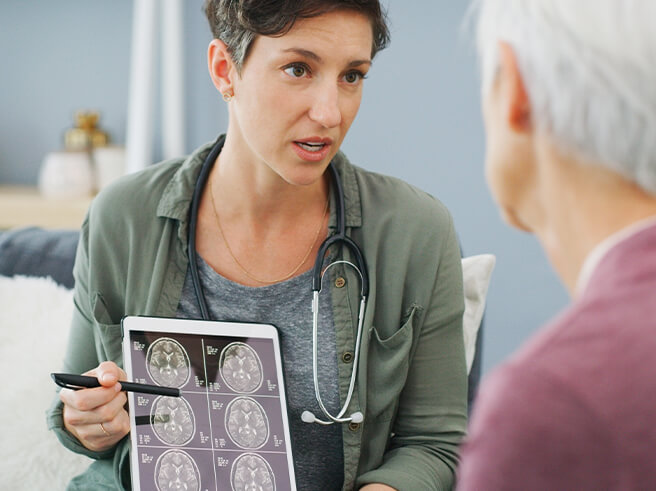Dementia
Loss of memory, cognitive and psychological changes, affected thinking and social abilities that interfere with one’s daily life – all are a group of symptoms that collectively describe dementia.
Dementia is not a disease, but rather a neurologic condition that can be caused by several different diseases – the most common of which is Alzheimer’s – and, depending on the cause, some dementia symptoms can be reversed.
Common Dementia Symptoms
The specific cause of dementia can be traced to damage to or loss of nerve cells and their connections in the brain.
Depending on the area of the brain that is affected by the impairment, dementia can affect different people in different ways, causing different symptoms. These include cognitive changes, such as:
- Noticeable memory loss
- Confusion and disorientation
- Trouble with visual and spatial abilities, such as easily getting lost
- Difficulty with communicating coherently, reasoning or solving problems, handling complex tasks, planning, and organizing, and/or coordination and motor function

Dementia symptoms also include psychological changes, such as: changes in personality, inappropriate behavior, depression, agitation, anxiety, paranoia, and hallucination.
Preventing Dementia
It is assumed that dementia is a normal part of aging, but it can occur in people under age 65 as well. While there are certain dementia risk factors that cannot be changed – such as family history – there are many more risk factors that can be changed.
For example, research show that an unhealthy diet, a lack of exercise, heavy alcohol use, smoking, sleep apnea, and high blood pressure, high cholesterol, and obesity are all risk factors for dementia that can be controlled. Also, maintaining required levels of vitamin D, vitamin B-6, vitamin B-12, and folate may lower your risk of dementia.
If untreated, dementia can lead to complications such as poor nutrition, the inability to perform self-care tasks, personal safety issues, pneumonia, and – with late-stage dementia – coma and death from infection.
Diagnosing and Treating Dementia in Southeast Michigan
Definitively diagnosing dementia and its type can be a challenge, but the experienced physicians at Associates in Neurology have the advanced training and technology to do so, including cognitive and neuropsychological tests, neurological evaluation, brain scans, and laboratory tests.
Although most cases of dementia cannot be cured, we can help manage symptoms with medication and therapy tailored to the patient’s specific condition and needs.
To learn more, contact us today at (248) 478-5512 to schedule a consultation at one of our convenient locations in the greater Detroit area. Or, if you prefer, use our secure, online Request an Appointment form.


